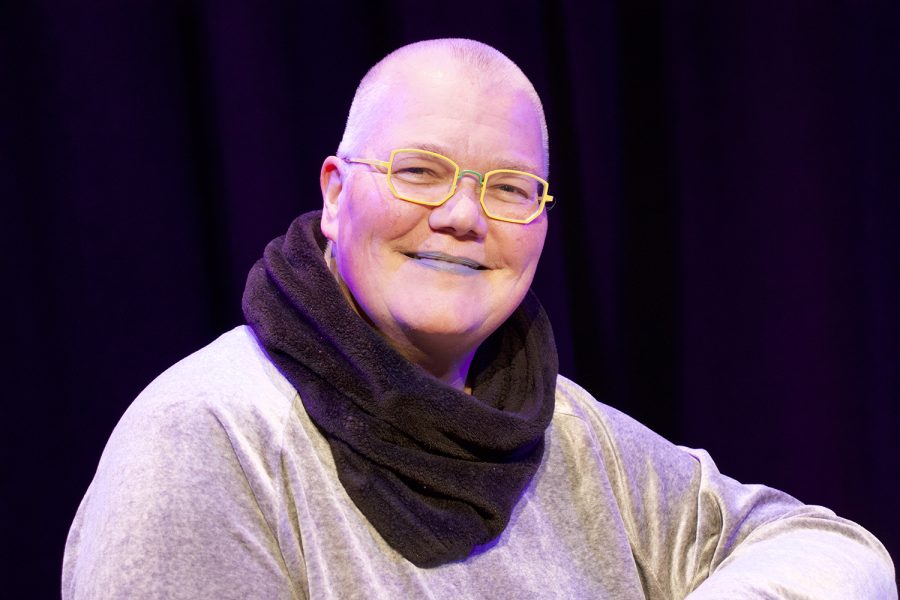Ask the Author: Petra Kuppers
Professor of Performance Studies and Disability Culture at the University of Michigan, Petra Kuppers’ latest book explores disability culture by focusing on a collection of performances over the last 15 years.
March 22, 2022
Petra Kuppers is the Anita Gonzalez Professor of Performance Studies and Disability Culture at the University of Michigan. Along with being an author and poet, she is a disability culture activist and community performance artist. Her latest book Eco Soma: Pain and Joy in Speculative Performance Encounters focuses on creating a disability culture within performance that leads to a socially just future by looking at past performances. Eco Soma was released on March 18 — Kuppers will host a book release party and reading at The Chauncey on March 31.
(This interview has been edited for length and clarity.)
The Daily Iowan: What does the title Eco Soma mean?
Kuppers: It’s an interesting title, because everybody has to ask that question, which I really enjoy. Everybody thinks they have a handle on it. ‘Eco,’ like ‘ecological’ — like, ‘What surrounds us?’ The word ‘ecology’ comes from a German word. It refers to ‘What is around us, what surrounds us? What are we part of? What are we in?’ ‘Soma’ refers to embodiment; the body, the bodily sensation. I’m doing a lot of work in somatics, which is an area where you train yourself to tune your bodily senses.
DI: What was your writing process like for the book?
Kuppers: The earliest performances in the book were performances in Australia and Oakland in 2006. So, in 2006 I was on a square in Melbourne, Australia, and I was witnessing a performance by many people who would be deemed to have cognitive differences. As you can read in the chapter, the show has a lot of messages of ‘I am alone, people are staring at me.’ A show that had quite a lot of registers of sadness going on in it, and yet, I was watching it. I was just enjoying witnessing these people and I was enjoying the energy that they put out, as some of them had painted eyes on their hands. They were throwing these hands out at the public all around them in this big public square. I got such a charge of joy from that, that I got really interested in the distinction between some of the sad content and some of the joyful delivery.
Related: Ask the Author: Candice Wuehle
DI: What is your favorite part of the book?
Kuppers: I love all the chapters, but one of the ones that I love best is the salamander chapter, which is the third chapter. That talks about an art project where my previous performance partner, Neil Marcus, and I co-created a show called The Salamander, like the animal. Neil passed very sadly, just a few months ago. He was very spastic and had a lot of pain in his life. He was in a wheelchair, and he spoke in a very slow manner. You needed a translation to understand what he was saying. One of the things that was going on at that time was that he really needed to exercise more, and he hated exercise, like many of us do, but he loved being in front of a camera. He was a wonderful performer. He had a great idea, he got himself an underwater camera and we went to local pools together. If I was in the pool, holding the camera taking a picture of him, he jumped into the water. That just became such a joyful activity that we invited other disability artists to come and join us.
DI: You’re giving a reading at The Chauncey in Iowa City — is there something that you’re hoping the audience takes away from it?
Kuppers: I hope the audience will take away the richness of what it means to pay attention to our bodily sensations. I hope people will come and will go on a little imaginary journey with me and feel into themselves and see what happens when we pay attention to the materials that surround us. When we pay close attention to how it feels to be in a space together, particularly right now as some of us are barely emerging out of our shells as we’re trying to negotiate masks, what it means to be out in the world again, as we’re engaging with the current state of the COVID pandemic. So, I hope people will come and join me in really thinking about bodily sensation.



